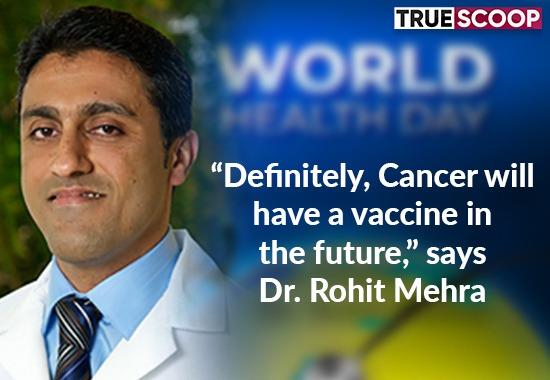Acknowledging the importance of health in living our best lives, World Health Day is celebrated on 7 April.
On the occasion of World Health Day, to raise awareness amongst our readers on critical health-related issues, True Scoop held an exclusive telephonic interview with Dr. Rohit Mehra. He is a Clinical Professor of Pathology at Michigan Medicine and a Faculty Member of the Michigan Center for Translational Pathology (MCTP). Focusing on the discovery of gene aberrations in genitourinary tumors and development of related biomarkers, Dr. Mehra played an important role early on in the discovery of recurrent fusion of TMPRSS2 and ETS transcription factor genes.
Here are some interesting answers given by Dr. Rohit Mehra during the interview:
Q. Which is the deadliest form of cancer and why?
Dr. Mehra: Lung cancer, prostate cancer and gastrointestinal cancer have the highest mortality in men worldwide; on the other hand, breast cancer, lung cancer and colon cancer are associated with the highest death rates in women.
Such cancers may be associated with high lethality because of a lack of implementation of effective screening measures, prevalence of lifestyle practices (like smoking) and a need for better therapeutics.
Q. Will Cancer ever have vaccines in the future? What’s your take on that?
Dr. Mehra: Yes, definitely. There are several vaccines in the research and development and clinical trial phase currently. Also, some recently introduced vaccines, like those against HPV, are highly effective in providing protection against HPV infections which are known to commonly cause cancer.
Q. Is our lifestyle or diet a potential add-on to the increasing cases of cancer recently?
This is a very important question. I firmly believe that healthy lifestyle choices and interventions like regular exercise, weight control, avoidance of alcohol, tobacco and prolonged sun, can reduce the overall risk of cancer.
Cancer is a group of diseases involving abnormal cell growth with the potential to invade or spread to other parts of the body. Over 100 types of cancers affect humans. The chance of survival depends on the type of cancer and the extent of disease at the start of treatment.
Dr. Mehra's claim about there being a potential vaccine for Cancer in the future is a sigh of relief.
